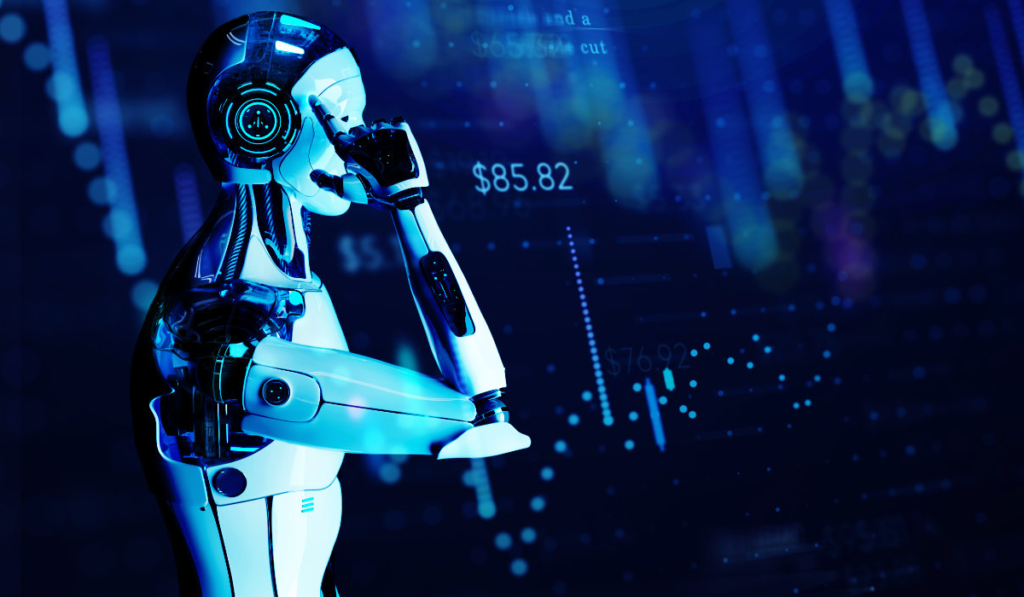From healthcare to education and even entertainment, AI has been pushing boundaries and reimagining processes. However, one sector where AI’s impact is truly game-changing is finance. Specifically, for investors, AI-driven algorithms have transformed how we approach markets, manage risks, and maximize returns. But how exactly is this technology shaping the financial landscape, and what does it mean for investors today? Let’s take a closer look.
A New Era of Financial Data Processing

Figure 1: A New Era of Financial Data Processing
To truly appreciate AI’s role in finance, we need to first understand the landscape of data. The financial world is awash with data—an ocean of stock prices, economic indicators, earnings reports, news articles, social media sentiment, and even weather patterns. Before AI, investors and financial analysts sifted through this data manually, making it impossible to process everything in real-time.
AI, particularly machine learning, has made it possible to digest vast amounts of data and turn it into actionable insights in a fraction of the time. Algorithms now can analyze both structured data (like historical stock prices) and unstructured data (like social media trends) to identify patterns, forecast market movements, and even predict potential crashes. This kind of speed and efficiency would have been unimaginable for human analysts just a decade ago.
How AI Algorithms Improve Investment Strategies
1. Quantitative Trading and Algorithmic Trading
Quantitative trading involves using statistical models to predict market movements and execute trades accordingly. AI brings several advantages to quantitative trading, most notably in speed and efficiency. Traditional quantitative trading models often require human oversight, where traders or analysts develop strategies and set parameters based on the data they have. AI, however, can optimize these models by continuously learning and adjusting in real time. Instead of relying solely on static historical data, AI algorithms incorporate real-time market fluctuations, global events, and even unstructured data, like social media sentiment or news reports, into their predictions.
High-Frequency Trading (HFT), a subset of quantitative trading, showcases AI’s power to the fullest. They act on them faster than any human trader can. In milliseconds, they analyze massive volumes of market data, execute trades, and lock in profits based on small price discrepancies that would be invisible or irrelevant to the average trader. HFT algorithms can place thousands of trades in a fraction of a second, capitalizing on tiny shifts in price to accumulate profits.
For instance, these algorithms can exploit arbitrage opportunities—where the same asset is priced slightly differently in two markets—by buying in the lower-priced market and selling in the higher-priced one within seconds. While this price difference might be minuscule, when executed at lightning speed across large volumes, it generates significant returns. However, it also raises concerns about market fairness. Critics argue that these rapid trades can destabilize markets by amplifying volatility, and there are growing calls for tighter regulation around HFT practices.
2. Robo-Advisors: The Democratization of Wealth Management
Robo-advisors, driven by advanced AI algorithms, have revolutionized wealth management by providing automated investment services at a significantly lower cost than traditional financial advisors. Platforms such as Betterment, Wealthfront, and SoFi leverage AI to manage portfolios with greater efficiency, tailoring strategies to each investor’s unique preferences, including their risk tolerance, financial goals, and investment horizons.

Figure 2: Robo-Advisors: The Democratization of Wealth Management
These robo-advisors have democratized access to financial advice, making it available to a broader audience, particularly those who may not have the resources for personal financial advisors or prefer to minimize management fees. Through continuous data analysis, these platforms monitor market trends and adjust portfolios in real-time, ensuring that investors are well-positioned regardless of market fluctuations. The AI systems behind these robo-advisors constantly rebalance portfolios, making adjustments that align with the investor’s profile, all without human intervention. This level of automation not only cuts down on costs but also ensures timely and efficient decision-making, making robo-advisors an appealing option for many modern investors.
3. Sentiment Analysis: Tapping into the Market’s Mood
AI algorithms excel at capturing and interpreting more subtle indicators—such as market sentiment. Social media platforms like Twitter, forums, and financial news outlets generate vast amounts of real-time commentary, offering insights into public opinion on stocks, companies, and broader economic trends. AI-powered sentiment analysis tools can efficiently scrape this unstructured data, transforming it into useful signals that indicate shifts in investor mood or market expectations.
If negative sentiment about a particular stock suddenly spreads across social media or financial news channels, AI can quickly flag this shift. By processing these insights alongside traditional financial data, AI algorithms can alert investors to potential risks, allowing them to anticipate short-term market reactions. This balance of sentiment-driven insights and hard data empowers investors to make more informed decisions, helping them avoid emotionally driven mistakes and act proactively in response to market sentiment.
4. Predictive Analytics: Looking Beyond the Present
One of AI’s greatest strengths is its ability to predict future outcomes based on past data. This concept has long been used in finance, but AI has pushed it further by developing models that can predict market trends with greater accuracy. Traditional methods rely heavily on historical financial data, but AI can consider alternative data sources like global news, weather, or even political events, providing a more comprehensive picture of what may impact market behavior.
These predictions aren’t just about stock prices. Predictive analytics can be used to forecast economic shifts, analyze company performance, and assess risk levels. Hedge funds and institutional investors leverage AI to stay ahead of the curve, making proactive investment decisions instead of reactive ones.
AI-Powered Risk Management
Risk management is a critical part of investing, and AI is making it easier to handle. By analyzing multiple factors, AI algorithms can identify potential risks before they become reality.
1. Credit Risk Assessment
In lending and banking, AI is redefining how institutions assess credit risk. Traditional credit scoring models rely on a narrow set of financial indicators, but AI systems consider a much wider range of data, including social media activity, spending behavior, and even phone usage patterns. This has allowed for more inclusive lending practices, extending credit to previously underserved populations.
For institutional investors, AI provides a more nuanced picture of creditworthiness and helps them make more informed lending and investment decisions. An excellent example of this action is how SmartDev supported a client in optimizing their credit reporting systems. By leveraging AI technology, SmartDev helped enhance both financial inclusion and security, enabling more accurate credit assessments and expanding access to credit for marginalized communities. This approach allowed the client to provide secure, reliable lending solutions while managing risk more effectively.
📌 Read more about how SmartDev can support the client here: Optimizing Credit Reporting Systems for Enhanced Financial Inclusion and Security
2. Fraud Detection
AI is a powerful tool in detecting and preventing financial fraud. By analyzing transaction data in real-time, AI systems can identify suspicious activity, such as unusual patterns of purchases or unauthorized access attempts. Machine learning models can continually adapt and improve, catching new types of fraud as they evolve. This not only saves money for financial institutions but also builds greater trust between them and their clients.
AI and Ethical Considerations in Finance
As with any technology, AI comes with its own set of ethical concerns, especially in a field as sensitive as finance. One of the biggest concerns is bias. Since AI systems are trained on historical data, they can sometimes perpetuate existing biases. For example, in lending, an AI system trained on biased data might continue to deny loans to certain demographic groups, reinforcing existing inequalities.
Moreover, while AI has democratized some areas of finance, such as robo-advisors, it has also contributed to growing disparities. High-frequency trading and advanced AI algorithms are often only available to institutional investors or wealthy individuals, giving them an unfair advantage over retail investors. The question of regulation also looms large. As AI becomes more embedded in financial systems, there’s a growing need for oversight to ensure these systems are transparent and accountable.
The Future of AI in Finance
As AI continues to evolve, its role in finance is expected to grow even more significant. But what might the future look like?

Figure 3: The Future of AI in Finance
AI-Driven Personalization: As more investors use AI tools, we can expect a shift toward hyper-personalized financial products. AI could soon analyze not only financial data but also personal preferences, lifestyle choices, and even health data to create highly customized investment portfolios. These portfolios will be tailored to individual risk appetites and long-term goals in ways that human advisors might struggle to match.
Integration with Blockchain and Cryptocurrencies: AI is also expected to play a significant role in the cryptocurrency space. Blockchain technology, which underpins cryptocurrencies like Bitcoin, is a natural partner for AI. While blockchain provides a transparent and secure ledger, AI can help predict market movements, identify fraudulent transactions, and create smarter contracts that execute automatically based on predefined conditions.
AI in Sustainable Investing: Sustainable investing is on the rise, with investors increasingly looking for opportunities to invest in companies that prioritize environmental, social, and governance (ESG) factors. AI will likely play a significant role in analyzing companies’ ESG performance by processing data from various sources, such as reports, news articles, and even satellite imagery, to assess the environmental and social impact of businesses. This can help investors make more informed decisions aligned with their values.
With great power comes great responsibility. As we continue to harness AI’s potential, it’s crucial to address the ethical and regulatory challenges that arise alongside its development. Investors who embrace AI will likely gain a competitive edge, but the technology is not without its risks.
🚀For those looking to stay ahead of the curve and embrace AI-driven investment strategies, SmartDev can help you get started. With a team of experts specializing in AI-powered solutions and custom software, SmartDev is equipped to develop the tools you need to stay competitive in today’s fast-evolving financial landscape. Ready to take the next step? Reach out to SmartDev today and start transforming your investment approach with cutting-edge technology.






